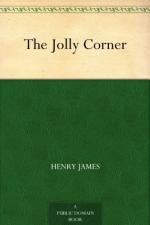The house, withal, seemed immense, the scale of space again inordinate; the open rooms, to no one of which his eyes deflected, gloomed in their shuttered state like mouths of caverns; only the high skylight that formed the crown of the deep well created for him a medium in which he could advance, but which might have been, for queerness of colour, some watery under-world. He tried to think of something noble, as that his property was really grand, a splendid possession; but this nobleness took the form too of the clear delight with which he was finally to sacrifice it. They might come in now, the builders, the destroyers—they might come as soon as they would. At the end of two flights he had dropped to another zone, and from the middle of the third, with only one more left, he recognised the influence of the lower windows, of half-drawn blinds, of the occasional gleam of street-lamps, of the glazed spaces of the vestibule. This was the bottom of the sea, which showed an illumination of its own and which he even saw paved—when at a given moment he drew up to sink a long look over the banisters—with the marble squares of his childhood. By that time indubitably he felt, as he might have said in a commoner cause, better; it had allowed him to stop and draw breath, and the case increased with the sight of the old black-and-white slabs. But what he most felt was that now surely, with the element of impunity pulling him as by hard firm hands, the case was settled for what he might have seen above had he dared that last look. The closed door, blessedly remote now, was still closed—and he had only in short to reach that of the house.
He came down further, he crossed the passage forming the access to the last flight and if here again he stopped an instant it was almost for the sharpness of the thrill of assured escape. It made him shut his eyes—which opened again to the straight slope of the remainder of the stairs. Here was impunity still, but impunity almost excessive; inasmuch as the side-lights and the high fantracery




